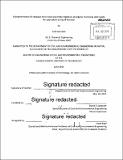Characterization of residuals from novel anaerobic digestion of organic municipal solid waste for application as liquid fertilizer
Author(s)
Karceski, Julie (Julie Katherine)
DownloadFull printable version (6.439Mb)
Other Contributors
Massachusetts Institute of Technology. Department of Civil and Environmental Engineering.
Advisor
David E. Langseth.
Terms of use
Metadata
Show full item recordAbstract
Management of organic municipal solid waste presents numerous challenges in India. Anaerobic digestion is one technology that can be used to address this problem, by transforming organic waste into methane via microbial activity. This process generates energy (in the form of methane) and a residual byproduct that can be used as fertilizer. Bottling and transportation of methane, however, presents numerous challenges. A novel anaerobic process is in development which would circumvent many of these challenges by instead producing a liquid biofuel. The purpose of this study is to determine if the residual byproduct from the novel process could still be used as fertilizer. A growth test failed to demonstrate the efficacy of the anaerobic residuals as a fertilizer, most likely because the residual byproduct was not dosed correctly. A follow-up growth test was able to show that the residual byproduct is not toxic to plant growth and if dosed in a lower concentration, could have potential as a fertilizer. The carbon to nitrogen ratio of the anaerobic residuals was favorable for plant growth. Further tests are needed to validate the use of the anaerobic residuals as fertilizer.
Description
Thesis: M. Eng., Massachusetts Institute of Technology, Department of Civil and Environmental Engineering, June 2015. Cataloged from PDF version of thesis. "June 2015." Includes bibliographical references (pages 38-42).
Date issued
2015Department
Massachusetts Institute of Technology. Department of Civil and Environmental EngineeringPublisher
Massachusetts Institute of Technology
Keywords
Civil and Environmental Engineering.